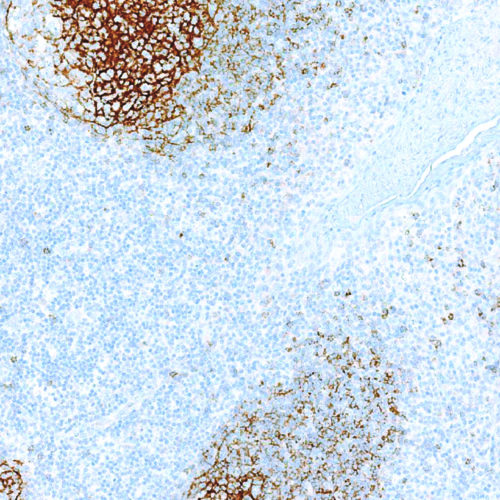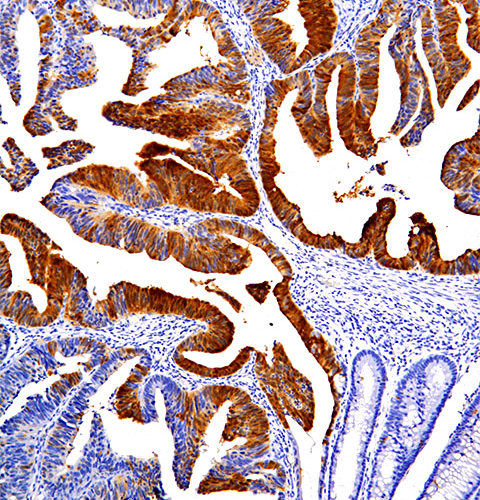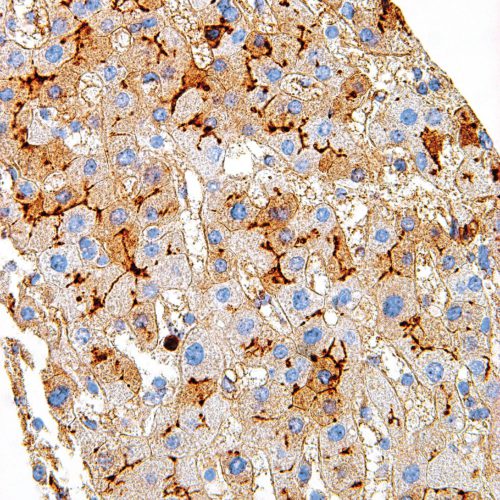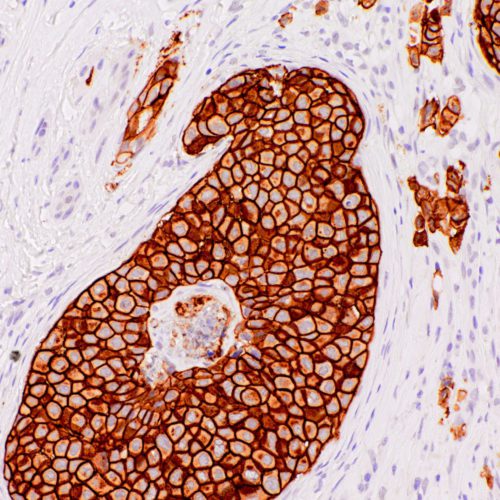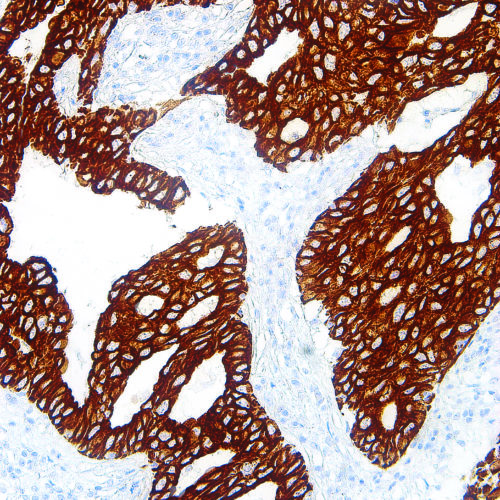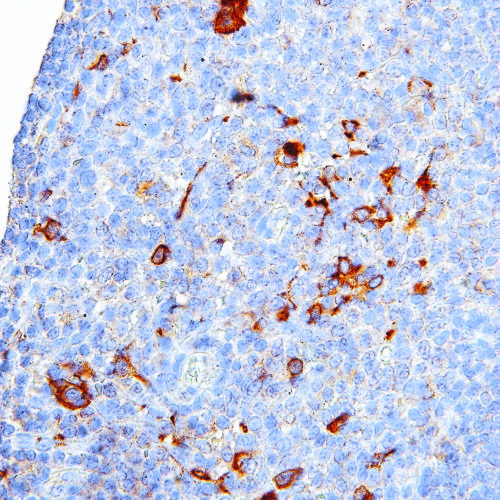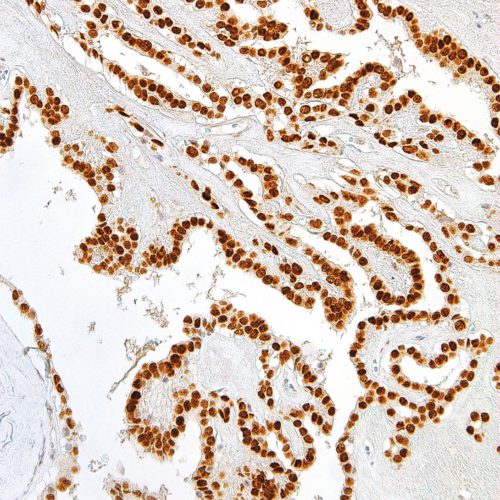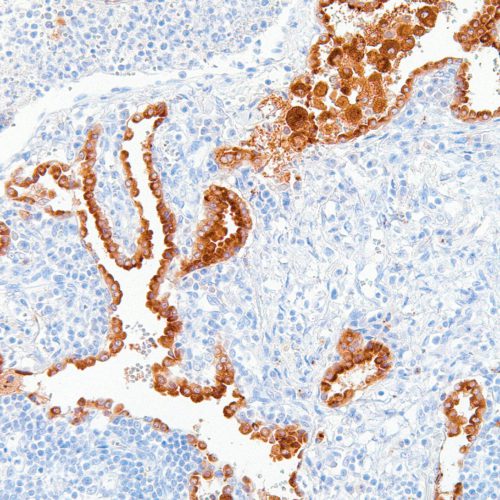High quality products to support Pathologists and Biological and Environmental Scientists
GeneAb™ CD23
$105.00 – $315.00Cluster of Differentiation 23 (CD23) is found on interleukin-4 activated B-cells, activated macrophages, eosinophils, and follicular dendritic cells, and is a receptor for IgE, an antibody involved in parasitic immunity. CD23 is present on Reed-Sternberg cells in Hodgkin’s disease. Follicular dendritic cells and activated B-lymphocytes produce strong staining in germinal centers and weak patterns in mantle zone B-cells. CD23 is helpful in differentiating chronic lymphocytic leukemia from mantle cell leukemia. Small B-cell lymphomas are sometimes positive, while precursor B- and T-lymphomas, myeloid neoplasms, and mature T-cell lymphomas stain negatively with Anti-CD23.
GeneAb™ p16 INK4A
$135.00 – $545.00The p16 (p16INK4A) protein is a cyclin-dependent kinase (CDK) inhibitor that plays an important regulatory role in the cell cycle. By controlling the transition between the G1 and S phases through regulation of retinoblastoma protein, p16 decelerates cellular differentiation and therefore acts as a tumor suppressor, making it the key marker in several human cancers including head and neck cancer, perianal lesions, melanomas, gliomas, lymphomas, and some types of leukemia. p16 is also clinically indicated in carcinomas of the esophagus, pancreas, lung, biliary tract, liver, colon, and urinary bladder.
GeneAb™ CD13
$190.00 – $855.00Cluster of Differentiation 13 (CD13) is a transmembrane protein that is overexpressed in both hematological and solid malignancies, including Acute Myeloid Leukemia (AML). Although hypogranular variants of AML are difficult to distinguish from other AML subtypes due to the morphology, the diagnosis of this variant is possible through using a panel of CD13, CD16, CD33, CD34, and CD117. Alternatively, a panel of CD13, CD34, CD43, CD68, CD117, CD163, lysozyme, and MPO is very useful for accurately diagnosing myeloid sarcoma and distinguishing it from large cell lymphoma, undifferentiated carcinoma, lymphoblastic lymphoma, malignant melanoma, Burkitt’s lymphoma, extra-medullary hematopoiesis, and inflammation. Since CD13 is expressed in both normal and neoplastic liver tissues, CD13 staining is useful for distinguishing between hepatocellular carcinoma and non-hepatocellular neoplasms.
GeneAb™ HER2/neu
$90.00 – $450.00The HER2/neu (c-erbB-2) proto-oncogene is a transmembrane receptor tyrosine kinase that is clinically indicated in a number of carcinomas. Overexpression of the c-erbB-2 protein has been associated with ductal breast cancer, as well as pulmonary and gastric adenocarcinomas. A correlation between HER2 and p53 has also been documented, as overexpression of both proteins has been associated with early invasion and metastasis in bladder cancer.
GeneAb™ Cytokeratin 7
$95.00 – $420.00Cytokeratin 7 (CK7) is a type II keratin which is present in transitional, ductal, glandular, and biliary duct epithelial cells. Cytokeratin 7 is a useful marker for distinguishing between carcinomas of the lung, breast, endometrium, and urothelia (positive stain) from carcinomas of the colon and prostate (negative stain). Cytokeratin 7 is present in nearly all primary lung adenocarcinomas, and is a useful marker in the differential diagnosis of ovarian neoplasms. Anti-Cytokeratin 7 does not stain intermediate filament.
GeneAb™ CTLA-4
$120.00 – $920.00Cytotoxic T-Lymphocyte-Associated Protein 4 (CTLA-4) is a receptor on T helper cells that functions as an immune checkpoint and downregulator of immune responses. Mutations in CTLA-4 are associated with insulin-dependent diabetes mellitus, Hashimoto’s thyroiditis, Graves’ disease, systemic lupus erythematosus (SLE), celiac disease, primary biliary cirrhosis, thyroid-associated orbitopathy, multiple sclerosis, and other autoimmune diseases. The spliced variant of CTLA-4 in SLE is present in the patient’s serum. Haploinsufficiency of CTLA-4 causes the immune system disorder known as CTLA-4 deficiency or CHAI disease (CTLA-4 haploinsufficiency with autoimmune infiltration).
GeneAb™ TTF-1
$50.00 – $160.00Thyroid Transcription Factor 1 (TTF-1) is present in diencephalon, lung, and thyroid. Anti-TTF-1 stains thyroid and thyroid-derived tumors, and is therefore used for distinguishing lung adenocarcinoma from germ cell tumors, malignant mesothelioma, and metastatic carcinomas from organs other than the thyroid. It is also useful for distinguishing small cell lung carcinoma from lymphoid infiltrates, and pulmonary from non-pulmonary adenocarcinomas in malignant effusions. The ability to distinguish between pulmonary and non-pulmonary adenocarcinomas is particularly useful in identifying tumors that have metastasized to the brain.
GeneAb™ Napsin A
$70.00 – $275.00Napsin A is a pepsin-like aspartic proteinase, closely related to Napsin B, expressed mainly in the lung and kidney and which is involved in the correct folding, targeting, and control of aspartic proteinase zymogens. Napsin A expression has been indicated in type II pneumocytes and adenocarcinomas of the lung and kidney. Anti-Napsin A is also useful for differentiating between primary lung adenocarcinomas and adenocarcinomas of other organs, due to the high specificity expression of Napsin A in adenocarcinomas of the lung.
